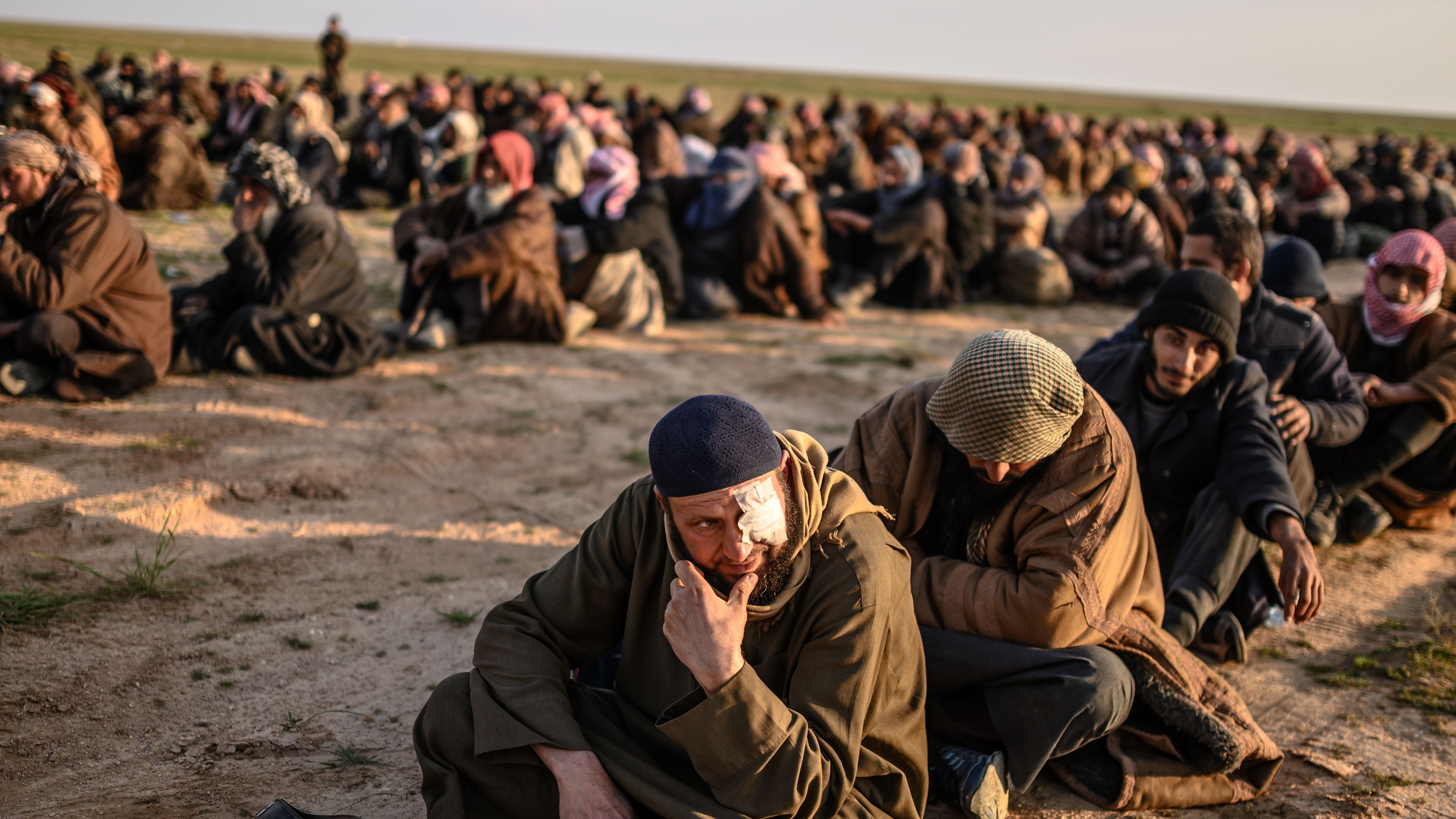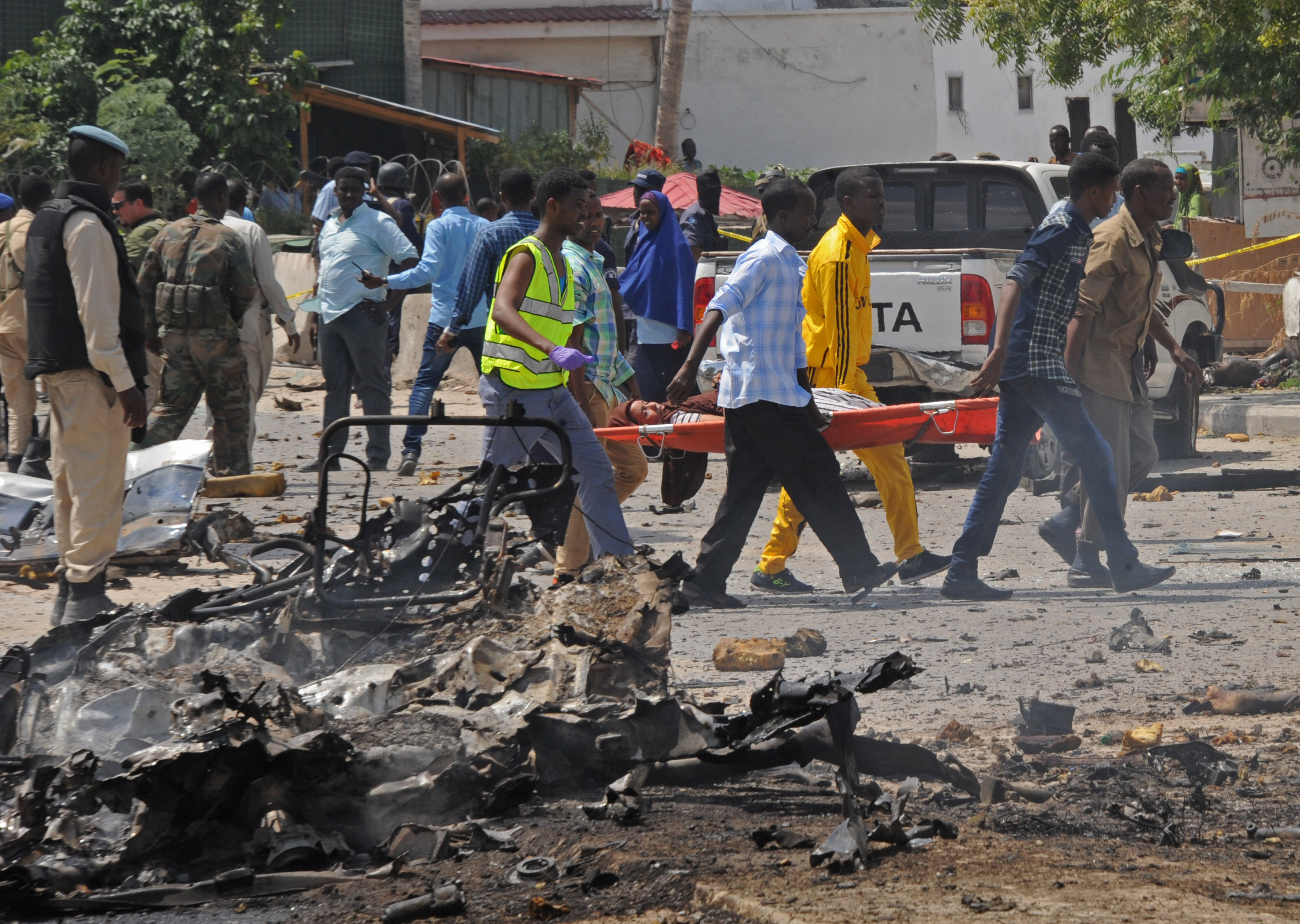Islamic State looks to Africa to rebuild following Middle East defeats
Alliances with local militants offer lifeline after collapse of self-declared caliphate

A free daily email with the biggest news stories of the day – and the best features from TheWeek.com
You are now subscribed
Your newsletter sign-up was successful
Battered and bloodied but unbowed after losing its Middle Eastern caliphate, the Islamic State is targeting another region of the world to establish a jihadist battleground.
Following the US killing of Isis leader Abu Bakr al-Baghdadi and “stinging defeats in Syria and Iraq”, the Islamists have “found a new lifeline in Africa”, The New York Times (NYT) reports.
Isis “has forged alliances with local militant groups in symbiotic relationships that have pumped up their profiles, fund-raising and recruitment”, says the paper - triggering a deadly rise in Islamist violence on the continent.
The Week
Escape your echo chamber. Get the facts behind the news, plus analysis from multiple perspectives.

Sign up for The Week's Free Newsletters
From our morning news briefing to a weekly Good News Newsletter, get the best of The Week delivered directly to your inbox.
From our morning news briefing to a weekly Good News Newsletter, get the best of The Week delivered directly to your inbox.
New allies
Joe Biden is currently deciding whether to stick to a schedule set by Donald Trump for all US troops to leave Iraq by 1 May. But that the US is even considering an imminent withdrawal is evidence of the extent to which Isis strength has “waned”, says CNN.
The US currently has around 2,500 troops in Iraq as part of Operation Inherent Resolve, the international effort to secure the total and enduring defeat of Isis in the region.
The jihadists’ grip on power in the Middle East has been loosening for some time. The US-based Wilson Center policy institute reports that “by December 2017, the Isis caliphate had lost 95% of its territory”, including its nominal capital, the northern Syrian city of Raqqa, and Iraq’s second-largest city Mosul.
A free daily email with the biggest news stories of the day – and the best features from TheWeek.com
Analysts say that this loss of territory led Isis to turn to Africa, where the group has “trumpeted” recent “battlefield wins” by Islamic extremists “to project an image of strength and inspire its supporters worldwide”, the NYT reports.
Isis has claimed responsibility for some of these deadly clashes, including an assault last month on Palma, a town in Mozambique.
Some experts view the Palma attack - in which dozens of people were killed - as a turning point “in what has until now been a widely ignored African war”, the Financial Times (FT) reports.
According to the Africa Center for Strategic Studies, “reported fatalities linked to African militant Islamist groups rose by a third in 2020”, while violence linked to the extremists was up by 43%.
Counterterrorism analyst Colin P. Clarke of global intelligence consultancy The Soufan Group says that “as an organisation more broadly, Isis is hurting”.
“To improve morale among its supporters, its leadership is seeking to elevate regional branches showing the most promise in launching attacks and maintaining a robust operational tempo,” Clarke told the NYT.
John Godfrey, the anti-Isis envoy for the US government, has also argued that outbreaks of jihadist violence across Africa “are clear indicators that Isis continues to actively seek to spread its malign activity to new fronts”.
“The attacks there are horrific, frankly, and show a complete disregard for the life, welfare and security of the local population,” Godfrey told reporters following the killings in Palma.
This warning was echoed by Paul Rogers, a professor in the department of peace studies at Bradford University. Isis-affiliated insurgency groups have been “developing for years” in Africa, reaching across “half a dozen countries, from Mauritania in the west to Chad, more than 3,000 kilometres to the east”, he wrote in an article on openDemocracy.
“Biden and his administration may want to see an end to Isis” and America’s so-called forever wars in the Middle East, but “rising Isis attacks in Africa mean the ‘war on terror’ is far from over”, according to Rogers.
Counter insurgency
As the NYT notes, “American military and counterterrorism officials have warned that Africa was poised to become the next frontier” in the battle against international terror organisations for “over a decade”.
Al-Qaeda has also “forged alliances with local jihadist groups in recent years and established new strongholds in West, North and Central Africa from which they can carry out large-scale attacks”, the paper adds.

Meanwhile, Isis is still firing warning shots in Syria, where insurgents this week “kidnapped dozens of people in a surprise desert attack, their largest such operation for at least three years”, The Times reports.
The group stormed a police station in al-Saan, a town in a western region that was “under Isis control until the Syrian army ousted the terrorists in September 2017”, the paper continues. In a bid to retake the area, “cells of Isis fighters have emerged in recent months to ambush buses carrying soldiers” and carry out “guerilla attacks across the border in Iraq”.
These attacks come as the Biden administration focuses on a push to confront Isis on the jihadists’ new frontier in Africa. The CIA has “recently completed work on a drone base in the north of Niger”, while “French and US armed drones and special forces are already based in Mali”, says Rogers on OpenDemocracy.
But as US forces “expand their presence in the north and southeast of Africa”, the withdrawal of troops from Iraq risks handing the group an opportunity to win back a foothold in the Middle East, he warns.
US officials have also warned that despite “its weakened condition”, Isis “remains a cohesive organisation in its former strongholds in Iraq and Syria”, the NYT says. An estimated 10,000 fighters went into hiding after the fall of the caliphate, and counterterrorism experts believe the group “still has a war chest of $100m and a global network of cells outside the Middle East, from the Philippines to Afghanistan”, the paper continues.
In Africa, meanwhile, Isis is funding activity in areas “previously untouched by extremist violence”, fuelling fears that what began as “an insurgency with just a few dozen fighters three years ago” could escalate “into full-fledged war”.
“None of these groups are extraordinarily powerful,” Joseph T. Siegle, director of research at the Africa Center for Strategic Studies, told the NYT.
“It’s just that they have enough capacity to destabilise these fragile states which are not able to maintain a security presence.”
Joe Evans is the world news editor at TheWeek.co.uk. He joined the team in 2019 and held roles including deputy news editor and acting news editor before moving into his current position in early 2021. He is a regular panellist on The Week Unwrapped podcast, discussing politics and foreign affairs.
Before joining The Week, he worked as a freelance journalist covering the UK and Ireland for German newspapers and magazines. A series of features on Brexit and the Irish border got him nominated for the Hostwriter Prize in 2019. Prior to settling down in London, he lived and worked in Cambodia, where he ran communications for a non-governmental organisation and worked as a journalist covering Southeast Asia. He has a master’s degree in journalism from City, University of London, and before that studied English Literature at the University of Manchester.
-
 Health insurance: Premiums soar as ACA subsidies end
Health insurance: Premiums soar as ACA subsidies endFeature 1.4 million people have dropped coverage
-
 Anthropic: AI triggers the ‘SaaSpocalypse’
Anthropic: AI triggers the ‘SaaSpocalypse’Feature A grim reaper for software services?
-
 NIH director Bhattacharya tapped as acting CDC head
NIH director Bhattacharya tapped as acting CDC headSpeed Read Jay Bhattacharya, a critic of the CDC’s Covid-19 response, will now lead the Centers for Disease Control and Prevention
-
 Epstein files topple law CEO, roil UK government
Epstein files topple law CEO, roil UK governmentSpeed Read Peter Mandelson, Britain’s former ambassador to the US, is caught up in the scandal
-
 Iran and US prepare to meet after skirmishes
Iran and US prepare to meet after skirmishesSpeed Read The incident comes amid heightened tensions in the Middle East
-
 Israel retrieves final hostage’s body from Gaza
Israel retrieves final hostage’s body from GazaSpeed Read The 24-year-old police officer was killed during the initial Hamas attack
-
 China’s Xi targets top general in growing purge
China’s Xi targets top general in growing purgeSpeed Read Zhang Youxia is being investigated over ‘grave violations’ of the law
-
 Panama and Canada are negotiating over a crucial copper mine
Panama and Canada are negotiating over a crucial copper mineIn the Spotlight Panama is set to make a final decision on the mine this summer
-
 Why Greenland’s natural resources are nearly impossible to mine
Why Greenland’s natural resources are nearly impossible to mineThe Explainer The country’s natural landscape makes the task extremely difficult
-
 Iran cuts internet as protests escalate
Iran cuts internet as protests escalateSpeed Reada Government buildings across the country have been set on fire
-
 US nabs ‘shadow’ tanker claimed by Russia
US nabs ‘shadow’ tanker claimed by RussiaSpeed Read The ship was one of two vessels seized by the US military